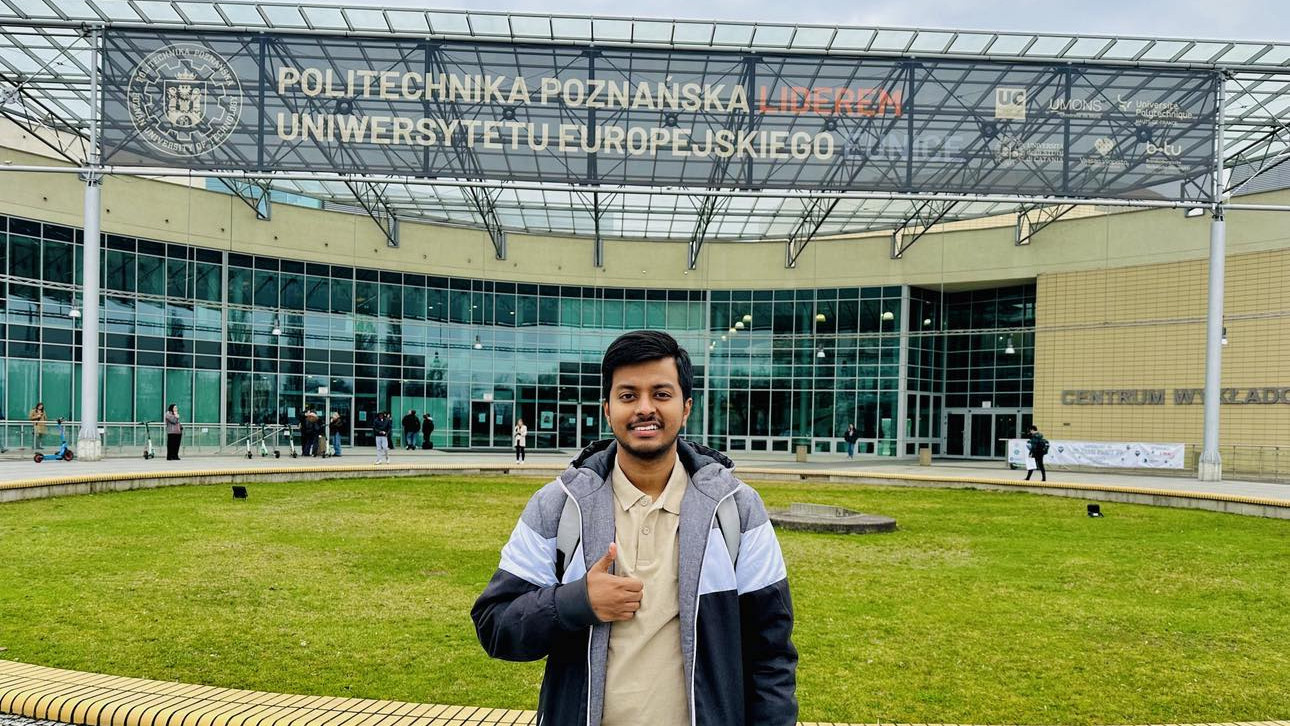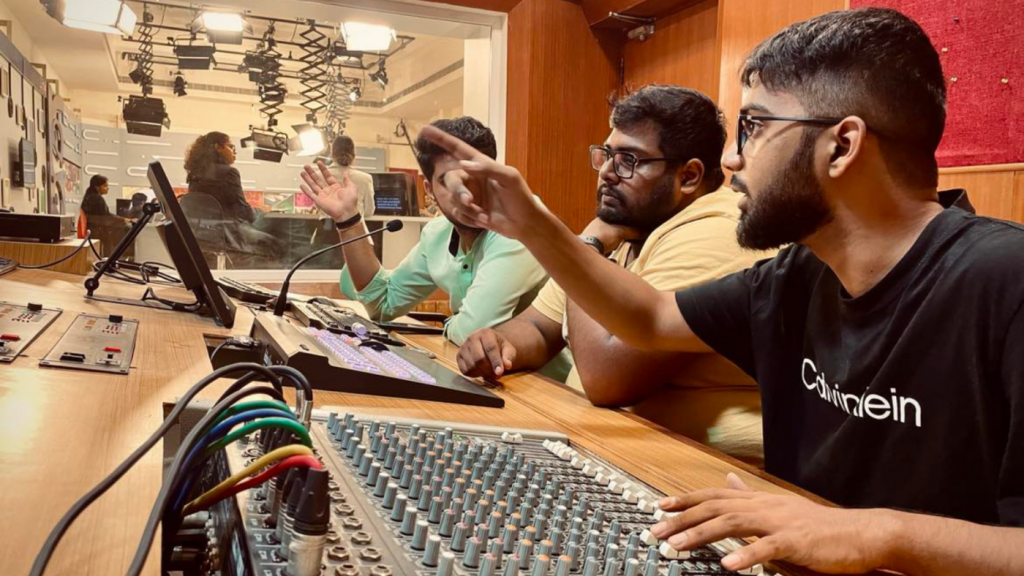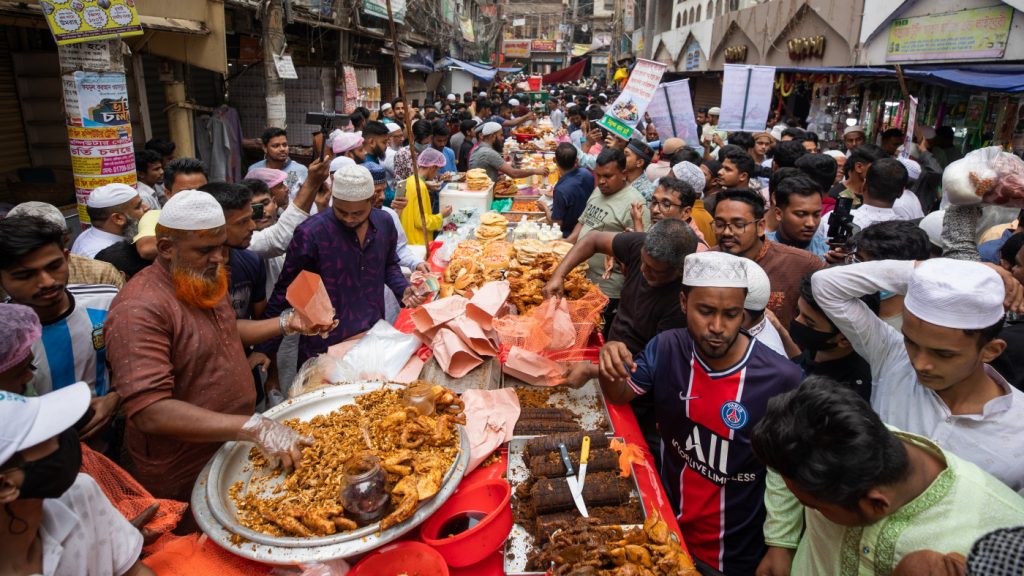Four thousand miles from home in Poland’s Poznan — DM Mahmudul Hasan, a 22-year-old engineering student from Bangladesh, is spending Ramadan away from his family for the very first time.
He also works part-time at a local kebab joint three days a week to meet his expenses.
The first day of Ramadan, the sacred month for Muslims abstaining from food and water from sunrise to sunset, was one of Mahmudul’s usual work days.
“I have been working continuously for the last nine hours with these gloves on. Not once have I removed them from my hand. There’s 20 minutes to iftar and I am still working,” he wrote on Facebook.
His post venting to his friends and family was accompanied by a lone smiley emoticon punctuating his fatigue and an image attached showing his hands — wrinkled with sweat from the gloves he hadn’t removed all day.
That evening, Mahmudul’s iftar was just a date and a glass of juice, he later told The Business Standard over a phone call.

Amid the loneliness, Mahmudul finds a little solace in video calls with his family back home — when, for a few moments, silence and tears speak louder than words from both sides.
Earlier at dawn, he prepared for Sehri all by himself, in his small kitchenette barely equipped to reheat pre-cooked meals.
“It’s the silence during Sehri that hits the hardest,” he said.
He does have three Bangladeshi roommates, though they are not very keen to fast. “No matter how many friends you have around, at the end of the day, these are times when you need your family most.
“Back home, my whole family would be awake [during Sehri]. Our kitchen would bustle with my mom’s only despair of marrying my father as she has to prepare everything all by herself [pun intended]. My sister would pretend to help Mom in everything by doing literally nothing. My father would watch Islamic shows on TV and try hard to wake my brother up.
“And here, it’s just me, some food that I don’t like and my thoughts,” Mahmudul shared as if his voice tinged with a blend of ecstasy ending up in pure agony.
Mahmudul longs for the Ramadan days from his childhood.
“I miss iftar with Tang, Piyaju, Beguni, and Chula-muri and all the disputes about whether to mix Bundia and Jilapi [form of local sweets] with muri mix or not…
“…and making plans with my friends for Taraweeh (the special night prayer during Ramadan), like how many rakats we’ll pray before slipping away for our adda [sweet Bengali pastime of aimless digressive conversation],” he shared.
Meanwhile, in Poznan, Mahmudul has to make a 15-20 minute tram journey for prayer, not to a mosque but to the city’s only Islamic Cultural Centre, since there is no mosque in the city.
Except for Friday, he can barely manage time to perform prayers in “Jamaat”.
Mahmudul happens to be just one drop in the ocean of students living away from home.
What’s desired to be a fairy tale of chasing dreams and earning a fortune in a foreign land, often turns into a lonesome venture, especially for young Bangladeshi students – at least 49,151 of whom went abroad to study in 58 countries only in the year of 2022.
According to the latest data from UNESCO, this number was 24,112 in 2013 and 16,609 in 2008.
Among them is one Taranna Tabassum, a media-communication student at Cardiff University who moved from Bangladesh less than a year ago. She is also experiencing her first Ramadan without her family.

A Facebook post she shared yesterday reads, “Nothing is more painful than celebrating Ramadan without the Azan…It doesn’t feel like Ramadan.”
Smartphone recordings, however, have come to her resort, which she later shared with TBS over a phone call.
“I thought of putting a timer on an app, so when it’s time for Fajr or Iftar… I’ll get to hear the sound of the azan…It’s a small thing, but it makes a difference,” she said.
With winter aligning Cardiff’s fasting hours closer to those in Bangladesh, the adjustment has been smoother, “but to explain to my friends why I am not having lunch or afternoon snacks with them is a bit awkward. But when I tell them, they all love the idea of fasting,” she said.
Taranna isn’t alone in this. She lives with two other Muslims from Pakistan — having each other around makes their Ramadan harmonious at home.
Together, they have plans to invite their non-Muslim friends over for iftar dinners to share the spirit of Ramadan.
“It will be a beautiful way to let others know about our religious culture and traditions. Usually, they all love our food,” she said.
Meanwhile, Cardiff University also hosted an iftar event for all of its students on 13 March, “Our university is arranging an iftar event for the students today. Everyone is welcome regardless of their religion,” she said.
Amid all these, Taranna’s heart too aches for home just like any other student abroad, or perhaps even more acutely.
“I was thinking to avoid this question, ’cause I know it’d make me cry again. There’s something special about breaking fast surrounded by loved ones…
“…At home, Ramadan was about enjoying various delicious foods, making excuses to get out of bed late, and whining about how hungry I was. I miss those days, especially the people,” she shared, noting the emotional toll her absence has on both herself and her family back in Bangladesh.

Only a thousand miles from home in India’s Chennai, Awil Ibrahim, 27, also feels alone, as he is navigating his first Ramadan away from family.
He is a master’s student at the Asian College of Journalism and resides in the college dormitory, being the only Muslim student among his peers.
“It felt really bad warming up Sehri [pre-dawn meal] early in the morning. I heated the food without making any noise, didn’t even turn on the light thinking it might disturb others in the room, and ate by the light of my laptop,” he wrote on his Facebook handle on the eve of first Ramadan.
The menu, for his first sehri, was only milk and cereal.
When Awil posted on Facebook, iftar was just under an hour away — a moment when, back in Bangladesh and similar Muslim-majority countries, streets fill with vendors offering a range of traditional iftar delicacies, and in every household, mothers are busy in the kitchen with final preparations.

He lives in a city of Tamil cuisine, still Awil finds himself unable to fulfil the simple comforts of having Piyaju, Beguni, or Halim, as he can’t find those anywhere nearby — so from now on he intends to save the evening snacks served at dormitory for iftar.
“The toughest thing is to get halal foods. Though India has some very good veg options; to get good kebabs and biryani, I need to get to the other side of the city,” Awil Ibrahim shared with The Business Standard over a phone call.
On usual days the dormitory’s restrictions on cooking leave him with limited options like instant noodles, a far cry from the rich, halal dishes he craves such as “plain bhaat (rice), daal (lentils), and torkari (vegetables).”
Awil, however, appreciates the support and respect he receives from his friends, college staff, and his dormitory warden. “My roommates and I don’t bother or interrupt each other’s ritual. Rather we help each other to perform them without any disturbance.”
He also has a plan to host a big iftar, inviting friends from all backgrounds, to share the spirit of Ramadan.
“Yes, it is my first Ramadan without my family, so I am learning a lot… But what I’m missing most right now is having the meals together with the family.
“Without family, the first day of Ramadan was tough, I guess Eid will be a lot tougher,” he said with a hushed tone of sigh.
Back in North America, Toronto to be precise, Sanzid Mahmud, a Master’s candidate in Environmental Sciences at York University, shares his apartment with two other students, none of whom are Muslim.
It doesn’t ache him anymore since he has found Ramadan to be a time of introspection and personal growth, even without his family not by his side.
This is his fifth Ramadan abroad.
To stay connected with his roots, for the last two Ramadan, Sanzid has been volunteering at a local mosque, helping to prepare meals for iftar for those in need.
“A lot of Muslim students come here to join us for iftar at the mosque. We have some Muslim individuals who made a fortune here in Toronto funding us for such activities every Ramadan. In other months as well, we offer food after Jummah prayers from time to time,” he shared with TBS.
Even though Sanzid has grown accustomed to being away, there’s a part of him that always misses his family during Ramadan.
“I know what I am missing out on. It’s those little things that you don’t realise you’ll miss until they’re not around. But it is part of life,” he added.
